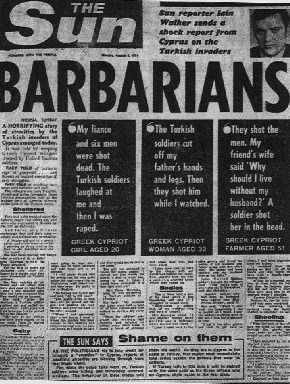


"Since then the Turkish side has been pursuing total separation of the communities. Last year all ethnic Turks were allowed to go north in exchange for promises that the ethnic Greeks in the Turkish area would be given free movement, better schools and more medical care. In addition, the Turkish side promised to allow the United Nations to set up posts in the north and provide the Greeks with moral and material support.
The Turkish side, keeping few of its promises, persisted in putiing pressure on the remaining ethnic Greeks to leave. As a result a steady trickle of departures has become a flood. Abouy 30 Greeks go south every day".
Steven V. Roberts, "The New York Times", 1.11.1976.
"Further expulsions belie Turkish claims of a voluntary exodus"
"Then we had a visit from two Turkish Cypriots on November 8. The were originally from Kokkina (a Turkish Cypriot village still under control of the Cypriot Government) and they said we had 15 days to leave. They said they had been told that they could have our house and that the authorities had send them roud to us.
"I did not believe this was true and said:'You cannot tell us to leave. What authority have you got?' So the taller man held up a piece of paper with a Turkish stamp on it, which gave his name as Hasun Mehmet and listed our house as 'F55'. In Yaloussa, the village was so small that we never had street numbers but this was the Turkish designation for our home. I told the men to leave and they did.
"But next day a Turkish girl who lived two houses away and who was a friend of mine came to our home. She said that Turks were going to burn my husbands' lorry unless we agreed to leave immediately.
"On the same day, Mr. Mehmet came back. He said he could bring some boxes for us if we nedded extra packing cases when we moved. Then he asked my husband to show him how the water-heater worked in our bathroom".
Robert Fisk, "The Times" 9.12.1976.
"Identical reports appear throughout the documents which also refer to acts of violence against Greek Cypriots. On October 9 this year, summary 4040, again dealt with Sector Six and stated: 'During night time 3/10 to 4/1076 five Tk Cyp (Turkish Cypriot) men entered the house of Gk Cyp Lysandros Foka in the vilaage of Ayias Trias, beat him up, robbed money in the value of 581 Cyprus pounds (#830) and raped his 14-years-old daughter. Another Tk Cyp was guarding outside while te five committed te crimes. The Tk Cyps were carrying a shotgun and fired at least one shot in the air".
"The Times", 13.2.1976.
"Death of a village of peace"
" the old countryman's eyes were heavy with tears he had not yet shed. What did he think would happen to Bellapais when the last of its people had left? His previously firm voice broke at the thought and the tears began to flow. 'Erimia', he said, 'Desolation'.
Bellapais has been dying by degrees since the beginning of the year when the Turks began movong out in small groups the 700 inhabidants of this hauntingly beautiful village, made world famous by Lawrence Durrell's 1955 bestseller Bitter Lemons.
There are now fewer than 20 people left in the village and they will all be gone by the weekend".
John Bierman, "The Guardian", 5.7.1976.
"Cyprus-A Bitter Lemon Squeezed Dry"
"Bellapais, the Greek Cypriot village made famous by Lawrence Durrell's "Bitter Lemons", is no longer Greek: two weeks ago its last seven Greek inhabidants gave up struggle against the Turkish squeeze. With their departure the number of Greek Cypriots in the entire Kyrenia District of northern Cyprus is now fewer than 30. Because of this, the Turkish authorities say that the United Nations force in Cyprus no longer needs a post in that area".
"The Economist" 4.9.1976.
